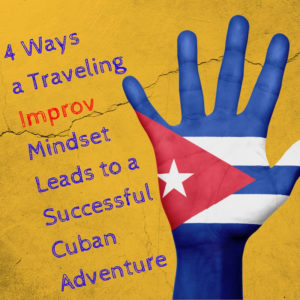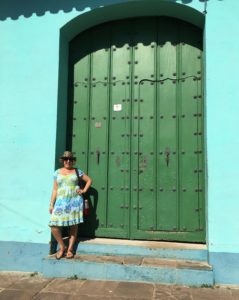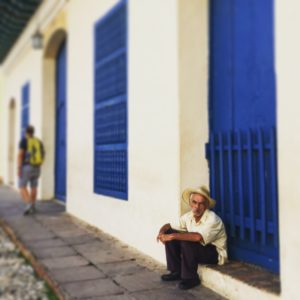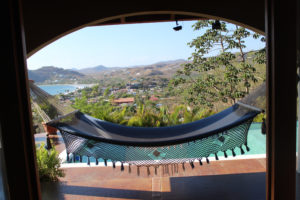 Cuba, like Italy, had been in my mind’s eye since high school. However, unlike Italy, Cuba has been deep in political and social tur
Cuba, like Italy, had been in my mind’s eye since high school. However, unlike Italy, Cuba has been deep in political and social tur
moil, and, the island’s relations with the United States have been non-existent for half a century. With relations (somewhat) restored since the Obama administration, Americans are able to visit Cuba legally under 12 categories. One of these categories is the People to People Tour that most Americans can qualify for — even if most Americans can’t afford it. The definition of the People to People Tour, according to Insight Cuba, is:
“Travel-related transactions pursuant to this authorization must be for the purpose of engaging, while in Cuba, in a full-time schedule of activities intended to enhance contact with the Cuban people, support civil society in Cuba, or promote the Cuban people’s independence from Cuban authorities; Each traveler has a full-time schedule of educational exchange activities that will result in meaningful interaction between the traveler and individuals in Cuba.”
The unfortunate situation is that a tour operator such as Intrepid Travel normally offers small group responsible, sustainable travel tours – focusing on real life experiences – that are one-third to half less than the People to People tour. So what’s the difference? The People to People tours are only for Americans, include very little free time, and, have a Canadian chaperone along for the ride as per the licensing agreement. While I highly recommend Intrepid, as their tours are geared toward people who want more than a mass tourism scratch-the-surface experience, it’s hard to swallow the $3,000 price tag that accompanies ALL week long People to People tours no matter the operator.
The privilege of traveling to Cuba as an American is costly. And, the amenities are few. Below are mild “warnings” that Intrepid issues to ensure that the People to People experience is a good fit for interested travelers:
- Power cuts and breaks in hot water are sometimes unavoidable, as in any developing country.
- Luxuries such as air conditioning, and even toilet seats, are often scarce.
- Internet access can be hard to come by, and when it’s available it’s often unreliable and expensive.
- Things don’t always go according to plan, and many things don’t work the same way as back home. Patience and good humor will go a long way in Cuba.
So what’s a potential American traveler to do? If you can afford the fee, GO – and go now because the current administration isn’t moving Cuban relations forward. And, how can patience and good humor be front and center at all times to ensure that the investment is a positive one? Use a traveling improv mindset for a more meaningful – and successful – experience:
1.Be flexible. Unscripted play requires the ability to go in a new direction at any given moment, as no one really knows what might unfold. In order to embrace the local culture, flavor and traditions, we need to let go of what we imagine the place will be like and embrace how the place actually is. Old Havana was a lot grittier than what was planted in my imagination; however, I still managed to find architecture and vintage cars and plazas that supported my vision. And, when I didn’t, I tried to embrace the reality of the situation – despite massive heat and humidity, which never shows up on any of the travel websites!
2.Be in the moment. The most important moment in improv is right now. The past is over and the future hasn’t happened, so this moment is what matters. While traveling, it’s often easy to lose sight of the present moment by being consumed with taking photos, videos, selfies etc. Be sure to take time to put down the travel guide, get off of social media and be fully immersed in whatever is happening – even if it’s nothing. In Cuba, this is much easier to do because Internet access is so limited! Instead of griping about it, use it as an opportunity to become more present. After all, Facebook will be there when you get home – a conversation with a local won’t. One of my favorite moments was chatting – in Spanish – with my local host on her porch rocking chairs in Viñales.
3.Be in the scene. I’m a visual person so I love to see stuff. Stuff can be an improv show, a mountain-view or street art. It’s easy to become passive and let the stuff happen around me. However, what’s even better is being a part of the stuff. Actually playing, moving and doing makes for an immersive shared experience. And, the bonds you form with others participating in the activities will be special because experiences create connections. In Cuba, I learned how to make mojitos, I salsa danced, I ate the local fare, I walked, I swam, I hiked, I chatted with anyone who was willing, I made friends with local dogs and cats. I wanted to do even more, but the heat and humidity wore me out, so I ended up enjoying the art of the nap some afternoons!
4.Be supportive. Ever see an improv show where an improviser responds to their scene partner with dialogue that makes no sense? Not only have I seen it, I’ve done it. It’s a classic example of not doing right by your partner. The best cooperative play happens when people are listening and making others look brilliant. When traveling, ask locals about themselves then shut up. Let them give you details about their favorite thing to cook, or the local restaurant in their neighborhood or their family members and pets. You’ll learn more about where you are, your experience will be richer, and you just might make a friend. I bought a piece of art on Plaza Vieja in Old Havana and the ladies in the art gallery and I exchanged stories about husbands and cats – it was one of the funniest moments of the adventure!
Bottom line — pack some toilet paper and leave the expectations at home. ¡Viva la Cuba!
Want to dust off the passport and embrace a playful adventure? Join Breakthrough Play and The Adventure Project at the …
1st Inaugural Playscape Retreat
Sunday, March 4 – Saturday, March 10, 2018
Casa Andalucia
San Juan del Sur, Nicaragua
A small group “playcation” for you to disconnect from devices, dive into an adventure and connect to other like-minded people while in the comfort of an eco-retreat designed to bring you back to the natural environment — and yourself.
Please visit The Adventure Project’s calendar for more details on all events.




